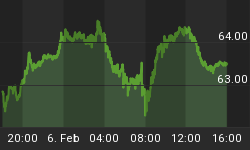Individuals, companies, and financial institutions default on an ongoing basis as part of the rejuvenation mechanism that is both capitalism's hallmark and its comparative advantage; a process Joseph Shumpeter called constructive destruction. Of course, F.A. von Hayek, who graduated from the University of Vienna a decade later than Shumpeter, would not be frightened by piecemeal defaults, and he certainly would not cite this risk as a basis for owning gold. The prospect of systemic default as the culmination of unprecedented financial speculation and leveraging, in contrast, would leave him with no practical alternative. Today the world finds solace in the promise of omnipotent state intervention. In a teaching career spanning three-quarters of a century, Hayek sought to warn others of the value of this promise. Most will wish they had listened.
From fatal conceit...
Hayek is perhaps best known for debunking the socialist explanation of the price mechanism. He observed that a spontaneous order arises from the interaction of a decentralized, heterogeneous group of self-seeking agents whose knowledge limitations force them to be price-takers, the crucial feature that makes the price system work. In his words, the "fatal conceit" of the socialists was their belief that this order could be designed by a planner attempting to set prices correctly, without realizing that a price system evolved spontaneously as a result of lack of knowledge. The same limited knowledge that impedes the economic agent's predictive power must necessarily constrain the planner's as well.
The universally held view of the US as a free market, or purely capitalist, economy is most ironic in light of how the single most important price, the value affecting all economic transactions, is fixed by central planners: the price of money. The price fixing of a good whose production, in turn, is monopolized by a government-sanctioned cartel is clearly not what Hayek had in mind with his concept of spontaneous order. This state of affairs, however, is old news. The Federal Reserve System was created in 1913, and under chairmen such as William McChesney Martin and Paul Volker it appeared to keep the level of state intervention to a reasonable minimum, at least compared to the price fixing schemes of Moscow's Gosplan. Since the removal of the comparison benchmark, though, the US version of central planning and state intervention has known no bounds.
...to moral hazard
During the tenure of Alan Greenspan, the Federal Reserve fostered a degree of moral hazard that has effectively abrogated the price mechanism in US financial markets. No longer is intervention limited to the manipulation of short-term interest rates through changes to the Federal Funds rate, as had previously been the case, but now includes the influencing of long-term rates directly through bond purchases by other central banks, systemic contorting of the statistics that serve as key market signals, emergency liquidity injections to deal with financial crises, and even direct intervention in the gold market through leasing and covert selling. As a result, what elements of the US credit system that have not already been socialized directly by the government sponsored enterprises, are now dependent on a government safety net of subsidies, guarantees, and what amounts to blanket damage insurance in the form of bailouts. Unsurprisingly, then, a firm conviction has taken root in financial markets that the government and its central bank have both the will and the ability to avert systemic failure. Faith in the omnipotent power of monetary policy is total.
The assumption that central bankers will always intervene to protect market participants from sizable losses has had a predictable outcome: complete disregard for risk. The psychological imperative for the blow-off stage of history's most intense period of financial speculation and leveraging has thereby been put in place, and the markets have obliged with gusto. The upshot is an exponential increase in debt and a swift deterioration in the sustainability of debt structures. In essence, we have paid for our blanket insurance of individual losses with the risk of systemic collapse.
The immortal asset
With the risk of systemic default, gold's greatest drawback becomes its greatest advantage: it cannot default. It is the only financial asset that one can own that does not appear simultaneously on someone else's balance sheet as a liability. In contrast to paper financial assets such as bonds, stock certificates, and Federal Reserve notes, there is no one whose bankruptcy would cause the value of gold to fall to zero. In contrast to industrial commodities, there is no one whose bankruptcy would diminish its primary source of demand, which is as a monetary instrument. Gold is commonly derided as a dead asset, providing neither dividends nor a stream of interest income. Its ability to stand in the face of default, even systemic default, however, makes it immortal as debt-backed financial claims threaten to succumb to the fatal conceit of central bankers. This virtue is enough to turn even the most sober of academics, not least Hayek, to the wisdom of W.C. Fields, who once quipped "I'm more concerned abouta return of my capital than a return on my capital."















